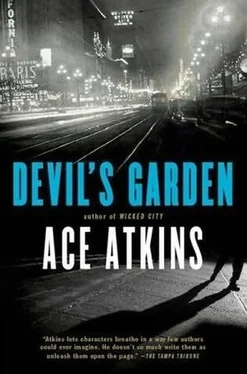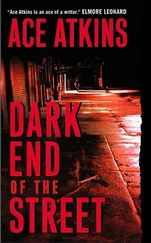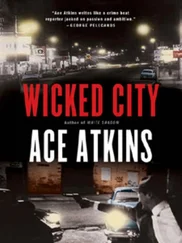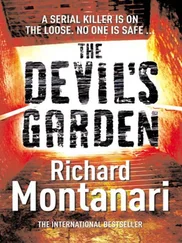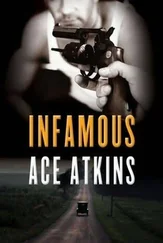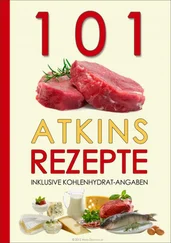“A speakeasy?”
“Since when did you become a nun?”
“From a reformed Catholic, I’ll take that as a compliment.”
“Thanks for the stew.”
“I think it’s better on the second day.”
“Has the old woman asked for the rent?”
“Yes.”
“And did you stall her?”
“I said she’d have it Monday.”
Sam didn’t say anything, only fished with the spoon in the bowl.
They had four dishes, some borrowed silverware, the table, and a Murphy bed that folded down at night. A table fan swept the room from its spot in the corner.
“What’s new on the Rappe girl?”
Sam finished the bowl and set it aside. He lit another Fatima and leaned back in the chair, mismatched from the other three.
“Just like the papers said, a ruptured bladder.”
“Caused by external force.”
“That’s what they said in the grand jury and what they’re taking to police court.”
“Still doesn’t make sense,” Jose said. “No other injuries?”
“She had bruises on her arms,” Sam said. “But Dominguez can argue that she got those when they were moving her around.”
“Nothing about her vagina being torn or bruised?”
“Not that we know about.”
“And no broken bones.”
“No broken bones.”
“Do you realize the kind of weight that it would take to burst a woman’s bladder?”
“They do call him ‘Fatty.’ ”
Jose shook her head and reached for his pack of cigarettes. She smoked and stared out onto Eddy Street, looking through the bars of the fire escape lined with clothes she’d scrubbed in a galvanized pot.
“Unless the bladder was diseased.”
Sam looked up at her and mashed out his cigarette. He reached for more coffee.
“The attending doctor ordered an autopsy immediately after the girl died.”
“And?” Jose said.
“After,” Sam said, “he had several of her organs destroyed. Including the bladder.”
“What do you know about this girl’s past?”
“What you read,” Sam said. “She was an angel plucked from heaven to remain a virgin until Arbuckle met her.”
“You know many thirty-year-old virgins?” she asked.
“Plenty.”
“I bet.”
“Jose, what are you thinking?”
“I’m thinking that a bladder can rupture from all types of things. I’ve seen some horrible bladder conditions brought on by venereal ailments.”
“Ailments?”
“Ailments.”
“When do you want to go dancing?” Sam said.
“After we pay the rent,” she said. “And when you finally unpack that damn trunk. You make me feel like this is a hotel.”
“Fair enough,” Sam said, standing and pulling himself into his tweed jacket and pulling his cap on his head. He tucked a little.32 in his side pocket and his Pinkerton’s badge at the breast.
“Where you headed?”
“Lucky me,” Sam said. “I get to play chauffeur to Mrs. Arbuckle.”
“You don’t mean…?”
“I do.”
HEARST MET MARION DAVIES when she was sixteen and performing in the chorus line in Stop! Look! Listen! on Broadway. He’d made the show every night it had run, paying a boy to wait at the stage door with flowers and jewelry and a diamond-encrusted watch that Marion had promptly lost on their third date. But he’d agreed to more watches-that she never wound or checked-and there were secret dinners at Delmonico’s and drinks at the Plaza and lovemaking that made Hearst feel half of his fifty-eight years. Hearst’s wife, Millicent, had been a chorus girl, too, but back in the nineteenth century, and after five boys she’d lost a bit of her charm and zest for life. With Marion, he’d finally found a solid girl with enough energy to keep up with him and realize that life was just one big rolling party where the world provided constant entertainment. And it was best in San Francisco. There they could escape the prying eyes of the scandal sheets and be out on the town as producer and ingénue, getting ready for the town’s world premiere of Enchantment in November.
By the time they left the Opera House, they were already feeling a bit of the champagne they’d had at the intermission of Tosca, and it had all been a bunch of laughs during the opera, because Marion had dressed as a little Chinese man in a blunt-cut wig and silk pajamas. She’d even made up her eyes to look like an Oriental, while Hearst had dressed as a grand emperor with a flowing red robe decorated with dragons and flowers and a Fu Manchu mustache pasted to his face.
A driver in a Cadillac touring car motored them up Nob Hill from the Civic Center, looping to the portico of the Fairmont, and the grand Chinese Ball that had brought out all the little yellow people from the Chinese colony to serve food, dance, and mix with the elite dressed gaily in their own pajamas and silks.
The lobby air had been perfumed with incense and jasmine, and there was much handshaking and silly bowing by the city elite, and the Oriental people scrambled around with big smiles, offering up pork with bamboo shoots and chrysanthemum salad and little cups of ny ka pa. Dozens of men donned a dragon costume that snaked through the party, and women dressed as men or as Oriental princesses squealed and yelped in the great candlelit room decked out in silk tapestries and gold.
Hearst clapped and pronounced the affair wholly magnificent when approached by District Attorney Matthew Brady and Chief O’Brien. Both men smiled and shook Hearst’s hand warmly. Marion did a little bow and stayed in character, rattling off some gibberish that no one in their right mind would think was Chinese. Somewhere was the sound of a xylophone. Cymbals crashed. The giant, bigheaded dragon wove in and out of screaming, laughing women.
“Judge Brady, Chief,” Hearst said, “Miss Marion Davies.”
Brady said hello. Chief O’Brien kissed her hand.
The men introduced their wives, in jade and ostrich feathers and floor-length Oriental robes. More fireworks crackled in the ballroom. The two women looked uncomfortable meeting Miss Davies, and Hearst put his arm around the smaller woman’s waist for reassurance.
The lobby, lit with green and red lanterns, cast the faces in a weird light. Judge Brady was a bit younger than Hearst and had been serious-minded enough to keep on his black tie and tails from Tosca. He had a hangdog face and droopy eyes, with gray hair parted to the side, but was sharp and smart and wanted more than anything to be California’s next governor.
“No costume?”
“I’m not much for theatrics,” Judge Brady said.
“Confucius see,” Hearst said. He smiled a big-toothed smile and rubbed the phony mustache. He then smiled normally, dropping the act. “A hold-over from my school days back east.”
The men exchanged glances with their spouses. Hearst looked to Marion.
The women left.
“Where can a man get an honest drink in this town?” Judge Brady asked.
A little Oriental walked past with small blue china cups on a silver tray. Chief O’Brien stopped the man and gathered three. The pointy straw hat on O’Brien’s head seemed out of place with his walrus mustache, giant gold-rimmed glasses, and bright blue eyes. The seams on his black pajamas were about to burst.
“Manslaughter?” Hearst asked.
Brady looked to Chief O’Brien. Chief O’Brien cleared his throat and said, “Our detectives have some new information.”
Hearst squinted his eyes, slid his hands into the opposite sleeves of his silken robe, and bowed. “I see… I see.”
Hearst toasted the men and took his drink.
Judge Brady finished the drink, pronouncing it god-awful, and placed his hand in the pant pocket of his tuxedo. He glanced around the room, his eyes staying away from Hearst’s stare, which was making him nervous. Hearst could always do that with the stare, could watch a man incessantly without prejudice or malice, his eyes merely lingering on the man’s face, making strong men grow shy. It was almost as if some felt Hearst’s gaze to be too private, too intimate, the way his eyes could rove over you and take in all of you and seem to know what you were thinking even as he was trying to figure it all out.
Читать дальше
